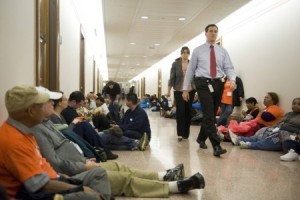The Evolution of Democracy

Fukuyama's 1989 thesis in the wake of the fall of Communism created ripples throughout the international relations community.
In 1989, international relations scholar Francis Fukuyama published an academic paper titled “The End of History” in The National Interest that literally took the IR community by storm. In the paper, written while the Cold War was literally on its deathbed, Fukuyama argued that with the defeat of communism, there was no longer any challenge to liberal democracy in the world and subsequently, there would be no longer any need for evolution of political thought.
Democracy had been weighed, measured, and been found wanting and the end result was that it had won the battle for supremacy and bragging rights globally. (Bonus points to whoever can name the movie that quote’s from)
Or has it?
Recently, as part of my interest in politics, I had become interested in not only the legislative processes of our own country, but also those of others. And the more and more I read about political processes today and the carrying out of democracy in its purest form around the world, the more I can’t help thinking that democracy, at least in the form that we’ve known it since the 20th century, is on the verge of an evolution of its own.
That’s not to say that Fukuyama’s thesis is not valid or timely. If anything, his argument still holds true in countries such as Egypt, Libya and currently, Syria, where they have thrown away old, dictatorial regime and replaced it with democracy. Even today, democracy is being seen as the ultimate form of government, the supreme “superhero” if you will that wins against all villains and prevails in the end.
But, back here in the United States, the “bastion” of democracy, the birthplace of the Declaration of Independence and the Constitution, are we really happy and content with the government system that we have? Is “democracy” really the final form of government, never to be replaced with a system more innovative and new?

As totalitarian regimes were toppled in what became known as the "Arab Spring" last year, society showed that even today, Fukuyama's thesis still holds its relevance. (MOHAMMED ABED/AFP/Getty Images)
I’m sure there are some who would vehemently answer no.
In the past year, events such as the Occupy Wall Street Protests showed the world just how discontent our public had become with the economic status quo following the recent recession.
Although much of the protests were aimed at the top 1% of earners, part of the protests also voiced discontent at the government’s inability to keep the promises they had made to fix the recession. (Not to mention the extreme disappointment and mistrust of authority in places like Portland, and although not an Occupy protest, at UC Davis.)
The protests eventually snowballed into a global phenomenon, with especially heavy protests in countries such as Spain and Greece, whose economies were especially hard hit post-recession.
On Capitol Hill, things aren’t looking much better. In an effort to prove that Congress can compromise, late last year, legislators attempted to form a “super-coalition” to tackle the issue of rampant government spending and to trim the budget. That failed. Then came the elections in November with a whopping win for the Republicans in the House, causing a mixed party government and, thanks to party polarization, the virtual inability to pass anything resembling legislation geared towards one party or another without bickering and infighting.

Part of the OWS Protests focused upon lawmakers and their inability to solve the economic woes of the American public.
It might be an understatement to say that Americans are becoming rapidly disgruntled with politics and government, as well they should be.
But what does this mean for democracy? Or rather, the evolution of democracy?
In America, we’ve reached a point in our political timeline where the basic facets of democracy are being challenged by party warfare. On the one hand, our representatives are supposed to represent the interests and needs of their respective constituencies and act for the greater good, on the other hand, they have a loyalty to the party and to ensure party legislation gets passed.
For some lucky members of Congress, these sides correspond with each other. Their constituents agree with the party line. But for the great majority of them, they conflict, and the sad part is, all too often, they choose the later as more beneficial to their overall career as lawmakers.
When our nation was first being founded, it was exactly what opponents of the Constitution like Thomas Jefferson (a W&M alum) and Patrick Henry feared. As history moved on, groups only caring about their own self-interest (or “factions” as they were referred to) would put their own interests above those of the public good and, in essence, destroy the very meaning of democracy.

Democracy as we know it today is increasingly sowing discontent and will need to adapt and innovate to meet the needs of the 21st century citizen.
That theory seems all too real right now.
So ready for the million dollar question? What happens now?
As we go into 2012, we find democracy on the edge of a pretty large hurdle. Democracy, at least in America, has gotten to a point where it is having a hard time solving the problems of its constituents. And an ever growing portion of our public, larger than ever before, is becoming more and more discontent with the system by the day.
And that brings us back to Fukuyama. Is democracy the ultimate form of government that countries will end up adopting? Looking at the global events of the present, it seems so.
But does that mean we’ll stop innovating at finding better forms to govern? Absolutely not.
In fact, as Americans move further into the 21st century, we’ll have to innovate. If we don’t, we’re going to have to be prepared for some extremely dark times ahead.




No comments.
Comments are currently closed. Comments are closed on all posts older than one year, and for those in our archive.